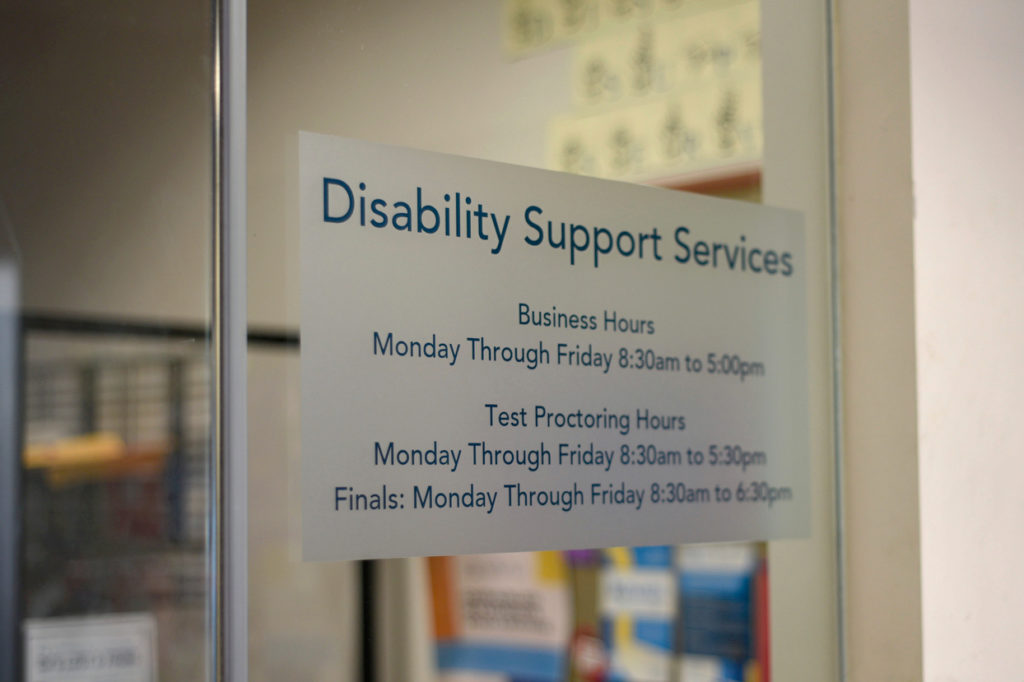A snowstorm had dumped at least six inches of snow across campus in 2019 when then-sophomore Meaghan Kacmarcik, with her service dog by her side, gazed up the icy steps leading to her new residence hall at 2109 F St.
Kacmarcik, who lives with a visual impairment, recalls that she would struggle to identify the steps that guide residents in and out of the building, sometimes nearly tripping down the staircase covered in snow. 2109 F St. lacks a ramp at its front entrance for students with disabilities and includes two series of stone and brick steps that reach up to the front door.
“There wasn’t like a first-floor entrance,” she said. “You had to go up a flight of stairs to get into the building. They weren’t shoveled. They were iced. I almost tripped and fell because with my vision going downstairs, it looks like a ramp to me.”
Now a first-year graduate student, Kacmarcik said she had moved to 2109 F St. for the start of the spring 2019 semester after switching from the first floor of Amsterdam Hall, an assignment provided through her housing accommodation to aid her vision and minimize her trips up and down flights of stairs.
But she struggled to share her former unit with a roommate who was allergic to dogs and two others who asked her to move out.
“It was an awful situation that was heavily affecting my mental health, and just being constantly being bullied, I couldn’t go back to my home on campus,” Kacmarcik said.
After bringing the roommate conflict to Campus Living and Residential Education officials, she said staff encouraged her to relocate to resolve the conflict.
After thousands of students called for officials to fire a professor who denied a student’s service dog from class in January, students said they feel more comfortable sharing their stories of a lack of understanding from professors and staff about disability issues across campus. Kacmarcik is one of several students who said they’ve faced a lack of flexibility from faculty and staff from offices including Disability Support Services, Student Rights and Responsibilities and CLRE in the classroom or in their living situations.
“The individual I talked to through housing obviously wasn’t aware of what the accommodations were and what the situation is in a situation where there is a roommate dispute where one of the roommates has a room for accommodations,” Kacmarcik said.
Later in her sophomore year, Kacmarcik said she moved into a third residence hall, convincing CLRE staff to relocate her to a one-person unit in Guthridge Hall. Kacmarcik said she had experienced a panic attack related to issues using the stairs to enter and exit the building, adding that her mom once called the GW Police Department after hearing that Kacmarcik was having suicidal thoughts.
She said she filed a report with SRR in fall 2019, alleging that she was discriminated against on the basis of her disability throughout the ordeal. The office told Kacmarcik that she faced no discrimination, she said.
“It still, to this day, haunts me that I never did anything and never said anything,” she said. “And when I did try to say something, I was told that what happened to me wasn’t discrimination and wasn’t worth any sort of action by the University.”
Maggie Butler, the director of DSS, said DSS notifies CLRE if a student has a housing accommodation before CLRE staff determine the room assignment and update the student directly.
“DSS reviews student-provided documentation to confirm the existence of a disability and related need for accommodations,” she said. “DSS also meets with the student to gather more information and further discuss possible accommodations.”
Butler declined to say how officials handle roommate conflicts involving DSS accommodations.
Nearly 4,500 students have signed a petition calling on officials to fire School of Business professor Marie Matta after junior Liza Malinsky posted a video documenting Matta refusing to allow her service dog Charlie in the classroom without paperwork after DSS officials told her she did not need any.
Kacmarcik said she never felt comfortable speaking publicly about her experience until she saw Malinsky’s post about her story. She said after three years, she is still struggling to overcome her experience.
“Definitely a notable, markedly different situation, but it still brought those same emotions,” she said of Malinsky’s situation. “And I don’t want anyone to ever be discriminated against based on their disability because I know how it felt like, what it feels like, especially when service animals are involved because oftentimes they are the physical manifestations of your disabilities.”
Madison Jennings – a senior and the president of the Disabled Students Collective, an organization that offers a safe space for disabled students on campus – said she has struggled with her own accommodations for her chronic illness. Jennings said the University grants her extended deadlines and excused absences, but she often needs to explain personal medical information to professors who do not understand her accommodations.
“As a chronically ill person, I have found that a lot of professors don’t know what that means,” she said. “And so I have to go into detail when I really shouldn’t have to about how that affects me physically, mentally and emotionally and the barriers that that presents to my academic success.”
She said DSC is advocating to implement a University-wide faculty training about accommodations and how to make courses more accessible, noting professors are not required to complete any accessibility training. Butler, the director of DSS, said the University provides training for faculty and staff on accommodations but declined to say whether the training is mandatory.
Jennings said the organization met with Kimberly Gross, the vice dean of programs and operations for the Columbian College of Arts and Sciences, and Rachel Riedner, the associate dean of undergraduate studies in CCAS, to discuss how to make professors more aware about accessibility and DSS accommodations.
Jennings said some students have told DSC members that their graduations have been delayed because of struggles to complete general education requirements in math and economics because professors have failed to combine visual and audio instruction.
Butler declined to say how officials are addressing concerns about math and economics professors failing to understand DSS accommodations.
Christine Yared, a freshman majoring in political science, said she handles an emotional support animal and receives accommodations including extensions for assignments. She said a DSS staff member denied her housing accommodation request for next year, which left her feeling invalidated.
She said the DSS representative arrived 30 minutes late to her appointment and failed to contact Yared’s health care provider for permission to offer accommodations prior to their decision to deny her request.
“An accommodation is not an advantage,” she said. “It is just putting them on equal playing field with everyone else, and most accommodations are not that much to ask for. And so sometimes I feel like the barrier to get accommodations is too high, and that means that a lot of people who need accommodations just don’t get them or don’t even try and pursue them.”







